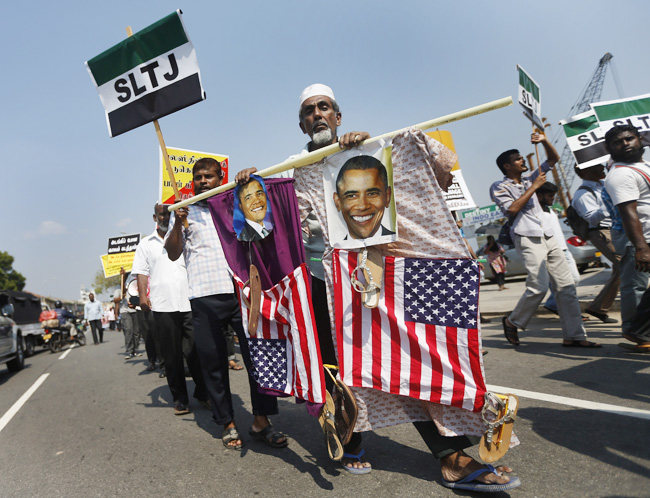“Resolution is inconsistent and impractical in asking Sri Lanka and UNHRC to do investigation simultaneously,” said, Dilip Sinha, Permanent Representative of India to the UN office.
Pakistan also rejected the resolution, saying it was about politics not human rights.
This is for the first time since 2009, India has abstained from the voting on the resolution – ‘Promoting reconciliation, accountability and human rights in Sri Lanka’.
All three times- 2009, 2012 and 2013 – India voted in favour of the resolutions.
Sinha noted that unlike the resolutions in 2009, 2012 and 2013, this resolution asks the United Nations High Commissioner for Human Rights (OHCHR) to “investigate, assess and monitor” the human rights situation in Sri Lanka which was an “intrusive” approach that undermines national sovereignty.
“It has been India’s firm belief that adopting an intrusive approach that undermines national sovereignty and institutions is counterproductive. Any significant departure from the core principle of constructive international dialogue and cooperation has the potential to undermine efforts of Human Rights Council for promoting universal respect for the protection of human rights and fundamental freedoms,” he said.
Moreover, any external investigative mechanism with an open-ended mandate to monitor national processes for protection of human rights in a country, was not reflective of the constructive approach of dialogue and cooperation envisaged by earlier UN General Assembly resolutions, he added. .
“India has always been of the view that the end of the conflict in Sri Lanka provided a unique opportunity to pursue a lasting political settlement, acceptable to all communities in Sri Lanka, including the Tamils,” the explanation given of India’s vote said.
“India believes that this Council’s efforts should contribute to a state’s own efforts in the promotion and protection of human rights. We are strongly supportive of Sri Lanka’s continued engagement with the OHCHR.
“We encourage the High Commissioner to continue to provide technical assistance in accordance with the relevant HRC resolutions. We are also supportive of close engagement of UN Special Procedures with the Government of Sri Lanka,” it said.
Sri Lanka on Wednesday rejected a U.S.-led call for accountability after the U.N.’s top human rights official recommended an international criminal investigation of abuses from the island nation’s civil war that ended in 2009.
U.N. rights chief Navi Pillay had recommended that the 47-nation U.N. Human Rights Council authorise an “independent international inquiry” in Sri Lanka because she said it had made little progress toward ensuring accountability for alleged atrocities and war crimes committed during its civil war against minority Tamil rebels.
After a quarter-century of fighting, the government crushed the Tamil Tiger rebels who said they faced discrimination from the Sinhalese majority. A U.N. report found that as many as 40,000 people may have been killed in the final phase of the civil war, but the government disputes that figure.
Sri Lanka’s efforts to investigate past human rights violations have not been effective or inspired confidence among victims and witnesses, said Pillay, the U.N. high commissioner for human rights, who also criticised what she called the continuing harassment and intimidation of human rights advocates in Sri Lanka.
Subramanian Swamy congratulates Prime Minister Manmohan Singh
BJP leader Subramanian Swamy congratulated Prime Minister Manmohan Singh for India not supporting the US-sponsored UNHRC resolution on Sri Lanka seeking an international investigation into alleged war crimes by the island nation.
“I congratulate PM Manmohan Singh for ordering the Indian delegation in UNHCR not to support the dangerous US resolution seeking international probe into the so called human rights violations during 2009 anti-LTTE war by Sri lanka,” Swamy said in a statement.
(With agency inputs)


Leave a comment